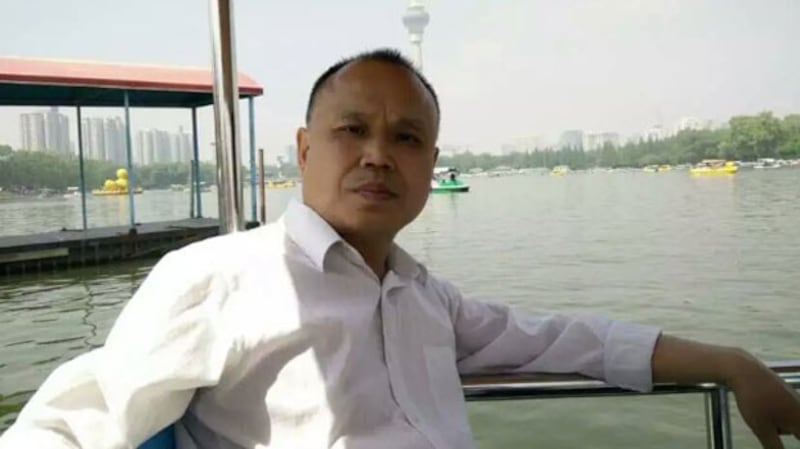The family of jailed Chinese rights lawyer Jiang Tianyong, who is scheduled for release at the end of this month, say they fear he could still be deprived of his freedom even after leaving prison.
Jiang called his family from the Xinxiang No. 2 Prison in the central province of Henan to wish them a happy Year of the Pig, his sister Jiang Jinping told RFA on Monday.
She also confirmed that her brother is scheduled for release on Feb. 28, at the end of a two-year jail term for "incitement to subvert state power."
"He asked me to go get him on the 28th, and wished our parents good health," she said. "That's what I discussed with the prison authorities, too."
"I will go to get him on the day; I definitely need to meet him in person, because I'm afraid he will be re-detained," she said. "We will only relax when he is actually out and back home."
"I'm pretty sure he will also have to get some medical check-ups when he gets out," Jiang Jinping said.
Jiang's U.S.-based wife Jin Bianling said she was very happy that her husband had been allowed to phone home on Lunar New Year.
"When the news came out that he called home on Lunar New Year's eve, saying that he hadn't been tortured and that he is getting out soon, it must mean that he hasn't done anything wrong, or he wouldn't have been allowed that phone call," Jin said.
"But I'm still worried that it may just be [a ploy], so that the family lets down its guard," she said.
Jin said there are many cases in which former political prisoners have been "released" from prison sentences, only to find themselves taken to an unknown location for several days.
"They disappear somewhere for several days before being allowed home, and some are put under house arrest after being taken straight back to their hometown," Jin said.
A person's hometown in China isn't always their place of work or residence as an adult, and some dissidents have been effectively isolated from their former lives by authorities in the home of their birth, and unable to take up their former employment.
Others are placed under close surveillance, sometimes with cameras in their apartments, and are barred from talking to the media or traveling without police permission. Many face grinding poverty, while family members can find their jobs or schooling affected.
"Of course, I'd like for him to go back to Beijing, because if they send him back to his hometown, things aren't so great there," Jin said. "I worry that he could end up like Cheng Guangcheng or Gao Zhisheng, unable to seek medical treatment for health problems."

Call for probe
Meanwhile, Xu Yan, wife of detained rights lawyer Yu Wensheng, called on Li Zhanshu, chairman of the Standing Committee of the National People's Congress (NPC), to investigate the authorities' treatment of her husband, who has been held incommunicado for more than a year with no access to legal representation.
"I sent out a request by [courier] today to Li Zhanshu and 14 other NPC delegates ... asking them to carry out supervision of Yu Wensheng's case," Xu told RFA.
"[I wanted them to] challenge the illegal and unjust behavior on the part of the agencies running this case," she said.
Last June, Jiang's family said he was being forced to take an "unidentified medicine" in prison.
Jiang's father Jiang Lianghou reported back on "terrible" conditions after visiting his son at the jail, with Jiang only allowed to take his allotted exercise in the corridors, not in the open air.
Jiang was also being prevented from buying basic necessities using funds topped up by his family for that purpose, and from receiving clothing parcels from his relatives, the family said.
Amnesty International said Jiang appears to be one among hundreds of human rights lawyers detained in a nationwide crackdown since July 2015 who have been force-fed medication.
Jiang's sentence was based on his setting up of a campaign group in support of rights lawyers detained in a nationwide police operation targeting the profession since July 2015, the prosecution said during his trial.
Jiang had "speculated" on politically sensitive cases, "incited others to illegally gather in public places" and "stirred up" public opinion, the indictment said.
He had also "seriously harmed state security and social stability" by "attacking and slandering the current political system, and attempting to overthrow the socialist system," it found.
London-based rights group Amnesty International said in its 2017 annual report that the ruling Chinese Communist Party under President Xi Jinping has pursued a "ruthless campaign of arbitrary arrests, detention, imprisonment and torture and other ill-treatment of human rights lawyers and activists."
Reported by Gao Feng for RFA's Mandarin Service, and by Wong Lok-to for the Cantonese Service. Translated and edited by Luisetta Mudie.
